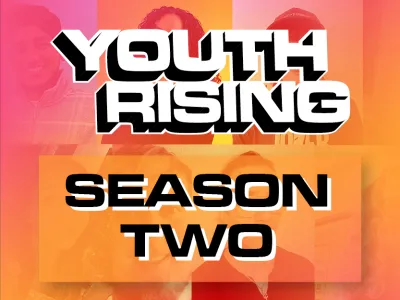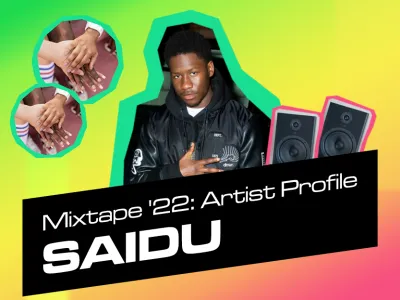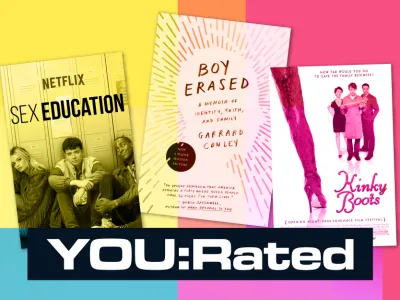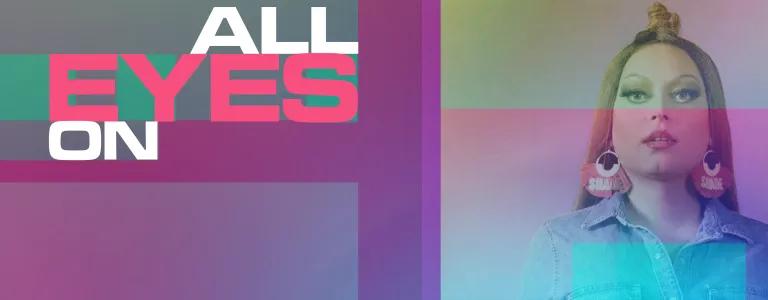
All Eyes On: Asifa Lahore
Include this article in your Skills Builder Journal. It could help you develop... 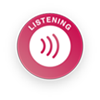
We’re back with another in our series celebrating great people who are achieving great things. This time, we spoke to Asifa Lahore, Britain’s first out Muslim drag queen, about living your truest life, why activism is important, and how finding who you are takes time…
Hi Asifa! Thanks so much for taking the time to chat with us. You’re Britain’s first out Muslim drag queen - why is that such an important milestone for you and for everyone? What does that mean for you?
Wow, what a question to start with! When I started doing drag, all I wanted to do was simply just to perform, entertain, and be self expressed. I basically started my drag career by total accident in 2011. I entered a drag competition in Soho called Drag Idol UK, which is a national competition that had already been running for ten years at the time! And I was the first Muslim person and South Asian person to enter. It’s quite a prestigious competition - past winners have been Baga Chipz, La Voix, and more. And it was that that gave me that title, because in the cabaret and drag circuit there hadn’t been a person from my background that was publicly doing drag, and that was out and proud.
My drag act was based around being British, South Asian, Muslim, and queer, and mixing those ideas. Initially I was very blasé about the title, but I soon realised the pressure of it. I realised the more successful I became, the more I was putting myself out there, the more people that identify as queer, or come from an ethnic minority background, or a religious background, would really identify with the show. They would come alone and end up telling me their life stories and the struggles they were going through. A lot of that landed with me and the struggles I had growing up and coming out.
So I think I inherited a title that came with a lot of pressure by accident! I didn’t set out to be a role model or a trailblazer…all I wanted to do was entertain. And by having this title I had to push forward, become an activist and raise the voices of people who were voiceless in many ways, or didn’t have the courage to be themselves. I was galvanised to not only speak about the issues that affected me, but also affected all the people that I represent with all the intersectionality of my identity. I think it’s an amazing title to have with a lot of pressure, and it means everything to me. I think it means something very special to my followers and to the world. Being Britain’s first out Muslim drag queen is kind of a big deal!
It is amazing! Talking about the pressure, do you feel used to it now? Because representation matters, right? You’re letting people see you can be in this position…
Most definitely. When I started, because I was the only one from a South Asian background, and out and proud, and being in the public eye doing my shows, I had to break down a lot of barriers. Firstly with venues that found my act too political, or didn’t understand it, or were wary if it would go down well with their clientele. Looking back now, it was a lot of microaggressions and racism and Islamaphobia, because in my show I would talk about stereotypes, and include a lot of parodies around being Muslim, South Asian, British, and queer. And I’m also diasbled as well, I’m on the blind spectrum. So a lot of my identities were mixed into my shows and initially people didn’t quite know how to take me. I had to break down a lot of barriers, because I was either too Asian, too queer, too this or too that for venues, and I think I would divide a lot of audiences at the time.
But having done debates on TV, and the Muslim Drag Queens documentary for Channel 4 in the last ten years, I think now people are so much more comfortable talking about those things, and I find it easier now. Having broken down those doors and raised my voice, so many more people are finding it easier, especially in the queer community, sub cultures and hidden circles. They’re finding it easier to be themselves, be empowered and raise their voice.
About half way through my drag career, I began transitioning publicly as well. It’s been empowering for me, but also to know that other people are seeing themselves out there, by seeing other people, like me, do it. There are so many people out there who didn’t have that ten years ago, and we’ve got social media to thank for a lot of that.
Yes, totally. Social media has really boomed in recent years as a platform for people - especially young people. Do you find that you have a lot of young people following you or looking up to you?
Young people for me are the heart and soul of life. I’m 38 and I still feel like my mind and body…well, maybe not my body!...but my mind is definitely young in that respect. What some young people may not realise is that at that age, you have this fearlessness, that when you get older you can end up losing. I’ve managed to keep a hold of that fearlessness from my teenage years. And I surround myself with a lot of young people, not just my followers, but my family and my neighbourhood. I like to know the scenes and the issues that are affecting them. Things like climate change and being your most authentic self.
I struggled a lot in my teen years, and twenties in particular, because being from my background, having to come out first as a gay man, and later as transgender, it really did take everything out of me. I had to break down the barriers within my family around South Asian culture and religion, and not at any point did I want to leave those communities or identities - they were very much part of me and I’m very proud of them. But for me it was about making my parents and my family understand that I'm still the same person they brought into the world, brought up and cared for. There’s nothing different about me! All it is, is that I loved someone of the same sex (when I identified as a gay man) and now I’m female. And even though I went through many difficult years, I’ve got to a place now where I’ve got my dream career, and my parents and most of my family in the UK and Pakistan are supportive. I come and go to Pakistan, my mum and my father are supportive of my career, they come to my shows, and they support my activism.
It’s so important to remember that being yourself doesn’t happen overnight and it’s a bit like climbing a mountain or eating an elephant. How do you eat an elephant? Bite by bite. One step at a time, bite by bite. It doesn’t happen overnight and it’s a lot to do with self care, in terms of ‘I’m gonna push to be myself and each time my energy is drained - because it’s a lot on your physical and mental self dealing with the pressures that come with being 100% yourself - I’m going to do something to take care of myself’. Whether that’s eating good food, getting a good night’s sleep, spending time with my best friends and watching TV, or going out clubbing. Stuff like that is really important when you’re trying to be yourself. For many people, especially people from ethnic minority backgrounds, being 100% ourselves is a minefield because we have to juggle so many identities. It really does take a toll on us, so you have to take care of yourself. By the time I was in my thirties, I found the groove to not only be authentically myself, but also take care of myself, and that’s a big thing that people will learn.
There seems to be so much pressure for young people to try and figure out ‘who they are’ at such a young age too. And like you said, it’s a time thing. You have to be gentle with yourself, because the outside world isn't always. So understanding that these things take time will help you get there…
SO much pressure is placed on us when we’re young! Choosing your subjects at school and choosing what you want to be and who you want to be when you’re older. We’re told “you’ve got to do this” but we’re never taught how! How do we get to where we want to be and who we want to be? And we’re also told this at a time when we’ve got raging hormones going through our bodies and our minds are going through all sorts, and there’s so much pressure!
I just want to tell young people who are going through that right now, don’t put a deadline on it. Don’t say “by this age I want to do this, or in five years time I want to do that”. Yes, it’s always good to have goals and ambitions, but also understand that you shouldn't set those ambitions in a rigid form, because you never know where life is going to take you. If someone had told me, when I was thirteen, that I was going to go on to be a drag queen and be on TV and perform up and down the country and that people would follow me, I would have said “no no no!” because I was so shy and I didn’t have the confidence to do that yet, let alone just be myself.
And also, in ethnic minority cultures, we’re taught that education is key, and we’re put under pressure to achieve. I remember my dad in particular was telling me to be a doctor or a lawyer or a teacher. To be in a career that would bring me financial security where I can pay the mortgage and bring up a family. And that is a valid career and course of life for some people. But young people should know that they also don’t have to give up their dreams and ambitions if they have a dream career that they want to go for. It may just take a number of years to get to, or they may have to do a lot of training for it. You might have to get out there and do a lot of free gigs or something to gain the experience. There just isn’t one formula. The 9-5 doesn’t fit everybody! And so much is placed on us achieve great grades in schools and college and university, but not everyone will get A*s across the board. Academics isn’t the only way to get a career that you want and to be the person that you want to be in life. Life will take you on all sorts of different pathways, but it’s important to trust your own instincts because no one can take that away from you.
There are a lot of people out there - and now some new young people! - who look up to you and are inspired by you. Do you have people who have inspired you and who you look up to in your life?
Most definitely. I’m always inspired by people of all ages, and in particular I’m really inspired by Leigh-Anne and Jade from Little Mix. Leigh-Anne, talking about racism in the music industry, in a documentary on BBC, and raising that issue, and trying to be herself in a girlband, in an industry that is predominantly filled with white, cis gender men, for me is inspiring. And for Jade, talking about her Arab roots, and how she felt like she wasn’t allowed to talk about that when she first came into the public eye, but now she’s at a point where she is being 100% herself. And someone like Zayn Malik. I’ve never ever seen someone from a South Asian background in the music industry. All we’ve seen in recent years is stereotypes like the one pound fish man. Very rarely do we see someone from the South Asian community really being successful in the music industry. It’s amazing.

It seems you’re very inspired by people who speak up for what they believe in…
I think if you have a voice and you have a point of view, you should never be ashamed to raise it. Because someone, somewhere in the world will listen to you, agree with you, and have the same opinion as you. If you’re feeling something, know that people before you have felt it. Whether it’s generations passed or whether it's people on the other side of the world, or in your home town that you haven’t found yet. I always say there are so many friends for you yet to make. There are so many people for you yet to meet. Don’t feel like you’re the only one feeling how you’re feeling. If you feel stuck, find another way. Some people may not agree or want to listen to you, but there will be a plethora of people that you don’t know of that will agree with you and blow your mind and that will support you.
The more people speak up, the louder their collective voice will be, it’s so true. So, you’ve touched a little on the challenges you’ve faced, but what about achievements. What are you most proud of?
It’s something very very personal. In 2015, I received a Proud Attitude Award for my activism, my mum came with me to the award ceremony, and I dedicated it to her. She’d also been part of the Channel 4 documentary that I did. And up until that point, she’d supported me, but in the background. She had said ‘you do what you need to do, I’m supportive of it, but I don’t want to be public about it’. And then that moment came, and after a lot of soul searching, she not only took part in the documentary, but was there at the awards show. And I was so moved by her. She is my ultimate role model! She came here in her early twenties from Pakistan, married my dad, learnt a new language, worked in a laundry factory, and brought up three children. She’s dealt with an autistic child, a queer child, a child that also wanted to marry someone who wasn’t part of the South Asian community, so she is the ultimate role model and I dedicated the award to her. I’m really proud of that achievement and of my mum.
What a force of nature she sounds like! And what a thing to be awarded for, your activism. You fight for authenticity and justice when it comes to homophobia in relation to religion and culture. What is it about activism that keeps you going?
I don’t like to see injustice in the world. I don’t like seeing young people not being able to be themselves. I don’t like seeing tears. When I see somebody that is living life at 10% when they could be living life at 100% in first gear, really being themselves, really being authentic, and achieving everything they’re meant to achieve, when I don’t see them doing that, it really saddens me.
And for me I like to call out things. I started calling out things that just affected me, but ten years on, if I see something that I think isn’t right, that not only affects me but affects other people from the different intersections I live in, I will call it out. I will call out racism in the gay community, I will call out homophobia and transphobia in the Muslim community and in the queer community, I will call out the lack of accessibility for disabled people in all venues. And that’s why I do what I do. Because okay, it might come from a selfish place where I’m doing it for myself, but I think we’re going through a time where people think that they can call each other whatever they want, and in most cases it’s not right. And for me, I just want to raise other people’s voices because I don’t like seeing people not being able to be themselves.
The world is constantly changing and evolving and if we can all do our little bit to drop a pebble in the ocean and create a ripple, then we can create massive tidal waves that can change the world. That’s what being a human is, that’s what being alive is all about. I just want people to feel like they are alive and not dead inside. Never feel like you can’t be yourself. If you choose not to live your life with full blown self expression and authenticity, then you’re not really living.
You can find Asifa Lahore on Instagram, Twitter and her website.


